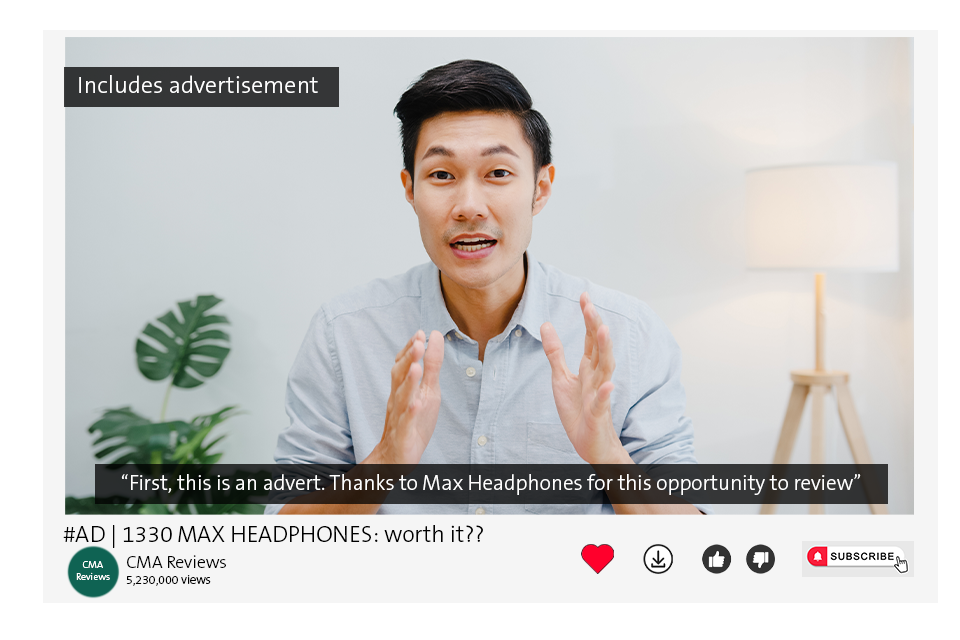Social media endorsements: guidance for brands
Updated 28 August 2025
It is important that businesses take responsibility for ensuring that paid-for endorsements which promote them, their brand or their products are properly labelled as Ads. We explain what the Competition and Markets Authority (CMA) considers to be adequate disclosure for paid for endorsements in our guide for content creators.
“Product” covers goods, services and digital content.
Businesses often reach out to content creators to help promote their brands or products on social media through:
- posts or photos
- stories, reels or videos
- endorsements
- tags
- competitions, prize draws or giveaways
- reviews
- gifts
- other forms of online content (for example: podcasts, livestreams, forums)
Sometimes brands enter into a formal agreement with content creators to post content or promote the brand. Other times, brands might send out free gifts in the hope that influencers post content about them.
Either way, these advertising campaigns boost brand awareness and increase sales. This is because content creators (bloggers, streamers, celebrities, or influencers) can have significant influence over customers and their buying behaviours.
All such promotional content posted on social media should be clearly labelled as ads. You have a responsibility to make sure that content promoting your brand is properly labelled as advertising in particular when:
-
it results from your marketing activities
-
it is being published on your behalf
This is the same if you offer payment, gifts or any other incentive, either formally or informally. Even if your business doesn’t control the content or ask content creators for anything in return: all ads must be labelled as ads.
Any paid for endorsements that aren’t clearly labelled as an ‘Ad’ may be in breach of consumer protection law or break industry rules on advertising.

The image above is an example of a video endorsement which the CMA views would likely comply with the requirements of consumer protection law.
Any form of incentive or reward – including money, commissions, discounts, leases or loans free of charge or in more favourable terms than those offered to the general public, gifts of any products – is payment.
If you know, or become aware, that content creators have not labelled posts about your brand correctly, you should take action – don’t ignore it.
Working with content creators
There are steps you can take to help your brand, and the content creators you work with, comply with the law.
Be clear with content creators
In your contract with your content creator, whether this is a formal or informal arrangement, work with them to ensure they understand their legal obligations to disclose upfront and clearly that any content they post for your brand is an ad.
If you send out free gifts to content creators, make sure you include clear instructions that any content posted as a result must be labelled as an ‘Ad’. This applies, even if you don’t ask for anything in return.
Have a policy setting out the brand rules on conduct that content creators should follow and make sure they and any intermediaries are aware of this.
This policy should require content creators to label all their content as advertising in line with the joint Advertising Standards Authority (ASA) / CMA guidance.
If your business contacts a content creator through an intermediary, such as a marketing or talent agency, make sure the intermediary also understands their legal obligations.
Check content creators’ posts
You should check content that refers to your brand or business yourself to ensure it is properly identified as advertising.
Where content is published on your behalf, you may be held responsible if it is misleading or otherwise non-compliant.
If something’s not right
If you identify content that hasn’t been labelled correctly, you should not ignore it. You should work with content creators, and any intermediaries, promptly to correct the content so that the ad is properly labelled. A proper advertising label should be clear, upfront, prominent and timely and we recommend using ‘Ad’ or ‘Advert’.
If a content creator repeatedly fails to label content correctly as advertising, as required in the joint Advertising Standards Authority (ASA) / CMA guidance, you are at risk if you continue working with them.
More information
- Who regulates hidden advertising?
- Fake reviews: CMA208
- Unfair commercial practices: CMA207
- CMA guidance collection on online reviews and endorsements and the CMA’s case page, for detail on previous and ongoing casework
- Advertising Standards Authority (ASA) / Committee of Advertising Practices (CAP) advice and resources
- Joint CMA/ASA ‘Guide for Influencers’
- CTSI Business Companion, in particular the guide on reviews and endorsements
Please note: guidance from the CMA is not legal advice.

